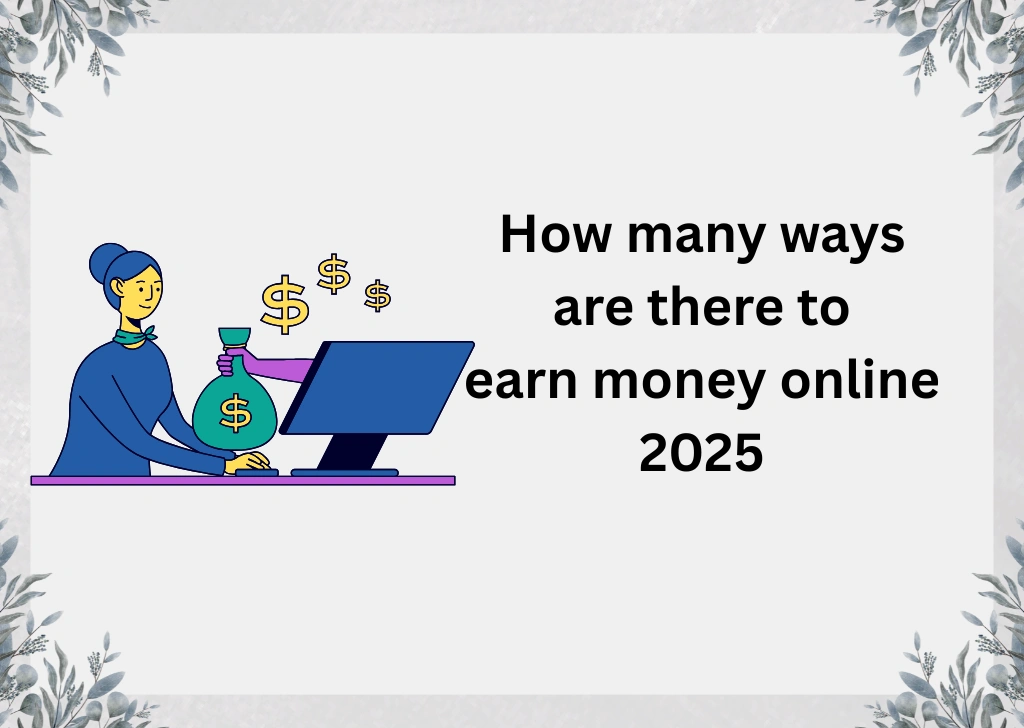It’s tricky to put an exact number on the “ways” to earn money online because new methods and variations constantly emerge. However, we can categorize the numerous opportunities into several key approaches. Think of these as broad umbrellas under which many specific techniques exist.
Here are some main categories and examples of how you can earn money online in 2025:

1.Freelancing and Gig Economy:
Skills-Based Services: Offering your expertise in writing, editing, graphic design, web development, programming, social media management, virtual assistance, translation, data entry, and much more through platforms like Upwork, Fiverr, and Freelancer.com.
Online Tutoring: Providing educational support in various subjects via platforms such as Chegg, Vedantu, and Skooli.
Transcription Services: Converting audio and video into text for clients using platforms like Rev and TranscribeMe.
Website and App Testing: Providing feedback on user experience for platforms like UserTesting.com.
Microtasks: Completing small tasks like data labeling, surveys, or simple content moderation through platforms like Amazon Mechanical Turk or Clickworker.
2.Content Creation and Media:
Blogging: Creating written content on a specific niche and monetizing through advertising (Google AdSense), affiliate marketing, selling digital products, or sponsorships. Platforms like WordPress and Blogger make it easy to start.
Vlogging (Video Blogging) on YouTube: Creating video content and earning through ad revenue, sponsorships, merchandise, and platform features like channel memberships.
Podcasting: Creating audio content and monetizing through advertising, sponsorships, selling premium content, or donations.
Social Media Influencer: Building an audience on platforms like Instagram, TikTok, or YouTube and partnering with brands for sponsored posts or product endorsements.
Selling Photos and Videos Online: Licensing your photography and videography through stock photo websites like Shutterstock or Adobe Stock.
Creating and Selling Online Courses: Sharing your expertise by developing and selling courses on platforms like Udemy, Skill share, or Teachable.
Writing and Selling eBooks: Publishing and selling your own books on platforms like Amazon Kindle Direct Publishing.
3.E-commerce and Selling:
Starting an E-commerce Store: Selling physical or digital products through your own website (using platforms like Shopify or Woo Commerce) or marketplaces like Etsy or eBay. This can involve drop-shipping (without managing inventory), print-on-demand, or selling your own creations.
Affiliate Marketing: Partnering with businesses to promote their products and earning a commission on sales generated through your unique affiliate links.
Selling on Marketplaces: Listing and selling new or used items on platforms like Facebook Marketplace, Craigslist, or specialized marketplaces.
Creating and Selling Digital Art and NFTs: Designing and selling digital artwork or Non-Fungible Tokens on specialized platforms.
4.Online Surveys and Rewards Programs:
Taking Online Surveys: Participating in market research surveys for cash or rewards on platforms like Swag- bucks or Google Opinion Rewards.
Cashback and Rewards Apps: Earning money back on your online purchases through apps and browser extensions.
5.Investing and Trading:
Online Trading: Buying and selling stocks, cryptocurrencies, or other financial instruments through online brokerage platforms. This requires knowledge and involves risk.
Peer-to-Peer Lending: Lending money to individuals or businesses online and earning interest.
6.Other Emerging Opportunities:
AI Content Creation and Editing: Using AI tools to generate content and offering editing or refinement services.
Virtual Reality (VR) and Augmented Reality (AR) Content Creation: Developing experiences or assets for these emerging technologies.
Online Gaming and Esports: Earning money through streaming gameplay, participating in tournaments, or creating gaming-related content.
Key Takeaway:
Instead of a fixed number, think of a constantly evolving landscape with numerous interconnected ways to leverage your skills, interests, and time online. The “best” way for you depends on your individual circumstances and goals. It’s often beneficial to explore multiple avenues to diversify your income streams.
Conclusion :
The digital landscape in 2025 offers an abundance of opportunities for individuals to earn money online, ranging from active freelance work to more passive income streams. There isn’t a single, definitive “number of ways,” as the online economy is constantly evolving with new niches and technologies.
However, the core avenues can be broadly categorized:
Service-Based Work (Freelancing & Gig Economy): This includes offering a wide array of skills like writing, design, programming, virtual assistance, tutoring, transcription, and app/website testing through various online platforms. This model offers flexibility and direct payment for services rendered.
Content Creation and Monetization: This involves creating valuable content in various formats (blogs, videos, podcasts, digital art) and leveraging it through advertising, sponsorships, affiliate marketing, or direct sales of digital products (e-books, courses). Success here often depends on building an audience and consistent engagement.
E-commerce and Selling: Whether it’s setting up your own online store, drop shipping, print-on-demand, or selling digital goods, e-commerce remains a robust way to earn by directly selling products to consumers.
Microtasks and Surveys: While offering lower earning potential, these provide simple ways to earn small amounts of money in your spare time by participating in online surveys or completing small, repetitive tasks.
Investing and Trading: For those with financial knowledge and a higher risk tolerance, online platforms allow for trading in various assets and peer-to-peer lending, potentially generating income from investments.
Key Success Factors:
Regardless of the chosen method, several factors are crucial for success in the online earning space:
Skill Development: Continuously learning and refining in-demand skills is paramount.
Patience and Persistence: Online income rarely happens overnight; it requires consistent effort and a long-term perspective.
Professionalism: Delivering quality work, maintaining good communication, and meeting deadlines build trust and reputation.
Niche Identification: Focusing on a specific area or audience can help differentiate you and attract targeted opportunities.
Scam Awareness: Being vigilant against “get-rich-quick” schemes and thoroughly researching opportunities is essential to avoid pitfalls.
Diversification: Combining multiple income streams can provide greater stability and increase overall earnings.
Q1: Is it really possible to make a full-time income online?
Yes, absolutely. Many individuals successfully earn a full-time income, and even significant wealth, through various online ventures like freelancing, e-commerce, content creation, and online businesses. However, it requires dedication, consistent effort, skill development, and often a significant investment of time upfront.
How quickly can I start earning money online?
The timeline varies greatly. Some methods, like taking online surveys or microtasks, can yield small amounts of money almost immediately. Freelancing can start generating income within weeks or a few months if you have in-demand skills and build a strong portfolio. Building a successful e-commerce store or a popular content platform (like a blog or YouTube channel) usually takes many months to even a few years to generate substantial income.
Do I need special skills or a degree to make money online?
Not necessarily a degree, but in-demand skills are highly beneficial. Many online opportunities value practical skills over formal qualifications. For example, excellent writing, graphic design, coding, digital marketing, or video editing skills are highly sought after. You can acquire many of these skills through online courses, tutorials, and practice.
How do I avoid online earning scams?
Be highly cautious of anything that promises “get rich quick” results with minimal effort or upfront fees. Common red flags include:
Requests for upfront payments: Legitimate opportunities rarely ask you to pay to get started.
Unrealistic income claims: If it sounds too good to be true, it probably is.
Poorly written communications: Grammatical errors and unprofessional language are often indicators of scams.
High-pressure tactics: Scammers often try to rush you into decisions.
Vague job descriptions: If the details of the work are unclear, be wary.
Phishing attempts: Be careful of emails or messages asking for personal or financial information. Always research companies and platforms thoroughly before committing any time or money.
